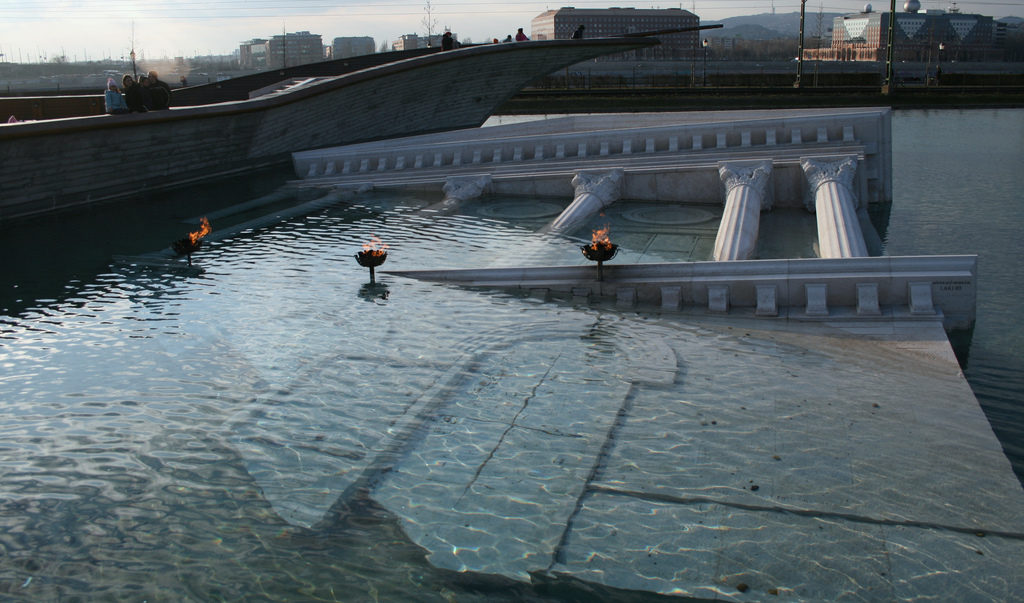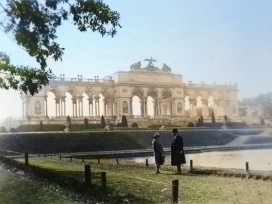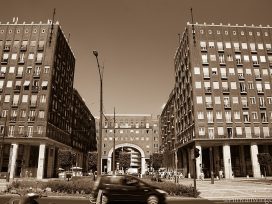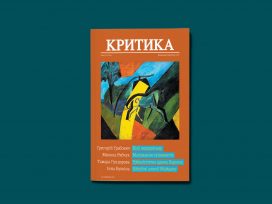A well-known, popular actor in a white shirt, with a short coat thrown over his shoulders, his hair blowing in the wind, reads out the “demands of the people” to a crowd of 10,000 on the steps of the Hungarian Television building. By his side is a bearded poet with a fiery face. It is 15 March 1989, a year before the first independent and free elections in Hungary. Like so many times before in central and eastern Europe, the role that poetry, literature, art, theatre and music has played is “leaven” in the “dough of history”. This is something of a tradition in this deplorably tempestuous corner of the world.

Memorial of the old National Theatre in the grounds of the newbuild, Budapest. Photo: Peter Siroki. Source: Flickr
Chopin was forced into emigration for standing up for Polish independence. Franz Liszt created a virtuoso transcription of a march composed in memory of a Hungarian nobleman, Francis II Rákóczi, who had headed an anti-Habsburg uprising a century and a half earlier, only to play it provocatively throughout Europe. Modern day history, too, keeps drawing performers to the stage here – where country borders are redrawn within the span of not decades but years. History has not usually left performing artists alone in more peaceful parts of the world either; but here, involving other fields of art, artistic movements and performances have always been a direct means of expressing suppressed emotions and passions. They are a romantic brand of patriotism and a yearning for liberty, frequently paving the way for historic moments. In March 1848, in the Habsburg ruled Pest, one poet by the name of Sándor Petofi called his vast audience to a war of independence with the first printed poem to bypass censorship. On the eve of the outbreak of the revolution, a patriotic piece was staged at the National Theatre, one that apparently dwelt on the past but afforded poignant criticism of the present, only for the poet to die after a year and a half of bitter fighting for independence and the struggle to fail.
Coded speech
Like in so many countries in the region in situations like this, “coded speech” invariably becomes the norm on stage, in books, newspapers and public discourse. The censor cannot be allowed to find fault with the performance, but the real message must come through loud and clear. In 1960s Wroclaw, Jerzy Grotowski experimented with “poor and cruel” theatre in a truly poor and cruel age, and a world order whose official ideology could only offer old-fashioned, heroic and clichéd romanticism or operetta. Pilgrims flocked to Wroclaw from the experimental theatres of the Communist Bloc to study the cruelty of truth and the unbearableness of self-delusion. I recall my older brother enthusing over Grotowski’s theatre, having returned home from there as a member of Péter Halász’s theatre company, Hungary’s most avant-garde theatre, and recounted to me, a young teenager then, his main experience: “Imagine a theatre completely lacking lies!” Which was quite a feat in an age interwoven with lies.
Not so long ago, Dmitri Shostakovich had to pay tribute to the “great idea” (of communism), with works such as Encounter at the Elbe and Song of the Forests, to allow him to create his brilliant string quartets and symphonies. And also not long ago, the musical committee of the Hungarian Workers’ Party “weeded out” works from Béla Bartók’s oeuvre, which it considered to be “formalist”, deeming only “folk-inspired” arrangements and works as appropriate. Consequently, epochal masterpieces like Duke Bluebeard’s Castle and The Miraculous Mandarin would not be played on Hungarian soil for many years to come.
While central and eastern Europe is brimming with examples of links between the performing arts and audiences, history and music, perhaps understandably the most inspiring one for me is the image which emerges – with colourful and subtle details filled in by living witnesses – from the workbooks and documents of the symphony orchestra I have served as director general for almost two decades.
On 16 December 1944 what was then called the Budapest Municipal Orchestra gave its last concert that year. At that time, the city had been bombed to bits, the country had for the past two months been run by Hungarian Nazis put into power by the Germans, and the Red Army was coming closer day-by-day. What else could have been on the programme that night but Lehár’s operetta, The Land of Smiles? A month and a half later the cannons were still roaring on the western bank of the Danube, when the surviving members of the orchestra gathered in the half-bombed, unheated City Theatre to play Beethoven, Tchaikovsky and Bartók under the baton of László Somogyi who had just escaped from Budapest’s Jewish ghetto. During the days of the country’s next big upheaval, in the autumn of 1956, Beethoven’s Egmont Overture would be the emblematic piece of the uprising against the Communist regime. By a strange twist of fate it was this very work – so profoundly capturing the dramatic atmosphere of the uprising – that ended up in the bag of the radio technician who, in addition to essential broadcasting equipment and a lacquer disc containing the Hungarian national anthem, fled the shelled building of the Hungarian Radio. The Egmont Overture was broadcast from the temporary studio set up in parliament when at dawn on 4 November Hungary’s prime minister, Imre Nagy (who would be executed later), addressed a global public as Soviet tanks shot at insurgents in the streets of Budapest. Two months of silence followed, and at a concert (beginning at 4 p.m. because of the curfew) on 31 December, the newly renamed State Concert Orchestra played the same Egmont Overture, with the legendary János Ferencsik conducting, to a moved audience. The Violin Concerto came next, followed by Beethoven’s Third, Eroica. At the start of the second movement, Funeral March, the audience stood and listened in silence to the music in mourning for the suppressed uprising, the murdered and disappeared relatives.
Dissatisfaction and distress
Scholarly literature has produced some major studies into why art and the performing arts in this part of the world keep getting thrown into the whirlwind of historic change. While it cannot be said that the performing arts in western Europe and America have been completely removed from social and political change, the difference in how much they have been involved has been remarkable. Time and again, the frequently redrawn borders have broken up peoples and nations. Perhaps nowhere more so than here did the cataclysms of the 20th century (and the peace treaties that followed) cause so much dissatisfaction and distressful change. Wroclaw is a case in point, where the German population of the town was forcefully resettled, making room for the Poles fleeing Soviet-occupied cities and seeking a new home.
There are countless similar stories. One might perhaps mention the Hungarian village that was quite literally cut in half by the border redrawn on a distant drawing board. The siblings of one family still recall not being allowed to cross the border to the funeral of their mother in the 1950s. They were allowed to bid her a final farewell from one end of their street over the shoulders of armed guards, with her coffin displayed across the barrier.
History’s utterly absurd, bizarre and inadmissible changes have been rendered somewhat more palatable with the help of art. Hasek’s Svejk sums it up nicely, as the Czech soldiers are dragged to the eastern front in the uniform of an empire that has oppressed their people for centuries, and were subsequently expected to put up an enthusiastic fight. Or one might cite Ionesco’s farcical and wacky reactions to the contagious dictatorships of the 1920s and 1930s, where herds of rhinoceroses marching in the streets become a matter of course. Going further east, Pushkin with his Decembrist leanings comes to mind – suffice to consider his poem “Siberia” – or Chekhov with his ever topical, scorching dramas about social hopelessness. Bypassing Proletkult, avoiding the period marked by Gorki and giving Dunayevsky’s brand of “syrup” a wide berth, I come to a personal memory. Led by Yuri Lyubimov, the Taganka Theatre visited Budapest for the first time in 1976. Their reputation came well before them. As a student I sneaked into a jam-packed audience, and relatively familiar with the text, barely listening to the interpreters, watched their performance of Hamlet in awe. Vladimir Vysotsky, himself, played the leading role. Without any reference whatsoever, we were aware the play could have been set in Moscow or Budapest, Prague, Bucharest, Sofia, or any other centre of the “Empire” for that matter.
Shakespeare’s hero declines the patronage of the ruling powers, knowing it has been offered to him by hands sullied by murder. Listening to the famous monologue from behind a curtain, dozens of shifty eavesdroppers reported every word to the members of the “political committee”, demonstrating their loyalty and substantiating the unreliability of anti-regime intellectuals. In this case Shakespeare came to help the Muscovites, allowing the critical mind to hide behind his unassailable name.
It was a Shakespearean idea that came to assume new meaning centuries later. In 1956 the Hungarian uprising had been preceded by some heated months. In a regime seeming to be on the verge of collapse – the “headless” Soviet empire – facts emerging about the atrocious show trials led to an incident a few weeks before the outbreak of the uprising. During what began as an innocent performance of Richard III, Scrivener’s monologue about pre-written judgements sparked a mass demonstration in the given historical moment.
Facing reality
The various areas of art cannot be denied their role in the political and social change. However, the sudden eruption of freedom and the change that took a different form in every country gave rise not only to the natural heroic attitude, but also to issues of survival. One of the basic tenets in the theory and practice of the communist system and its wielding of power was the superiority of the state. It immediately follows that the official establishments of the performing arts enjoyed relative financial security, in return for which the ruling powers expected loyalty and certain standards of quality. Inebriated from the whiff of freedom in the early 1990s, but quickly sobered up after facing up to reality, post-communist countries had to deal with the previously unheard-of issues of survival and maintenance. With the radical decline of the state’s role, financial hardships, the emergence of the system of local governments, countries frequently sought to remedy their economic woes by cutting back considerably on funding for the performing arts.
Actors, musicians, ballet dancers and entire companies lost their permanent jobs to the strange and unpredictable system of the free market. At the same time, a great many artistic achievements and works of art became weightless in the eyes of the ruling powers in comparison with the previous decades and centuries. While previously the publication of a single poem or a single concert programme might raise eyebrows and lead to the convocation of the Political Committee, today, essentially anything can be written and performed without any major political consequence. Of course, the distribution of public funds often involves some not-so-subtle distinctions, and theatre companies or orchestras favoured by the authorities might receive significantly more money than a company that voices criticism.
The democratic systems of distributing public funds that have evolved over many decades in western Europe are yet to be adopted here. Rather than applying the “arm’s length principle”, the system of “hand-feeding” has greater currency in many post-communist countries. Seeking to address this problem, the independent theatrical system wishes to preserve its free critical and free spirit vis-à-vis the official companies through more modest financing but without the political constraints. As this article is being written, the row in Budapest continues over the change of director of the National Theatre, the outcome of an otherwise lawfully conducted procedure. The outgoing liberal director bids farewell with Klaus Mann’s Mephisto, making no attempt to deny the fact that Hendrik Höfgen’s figure can be seen as his successor, the incoming director, who is on good terms with the government. Thus Goethe and a playwright from 1930s Germany make a comeback in a national theatre of a country in central and eastern Europe.
Grip of power
It would seem, then, that the curse afflicting our countries for centuries has not been lifted. The performing arts are left the choice of either participating in political and historical processes or, failing to do so, of being in disgrace with the ruling powers. Or worse still, of losing the interest of their audiences. History has taught us that Dmitri Shostakovich and many others could not escape the grip of power without giving in. Béla Bartók, Krzysztof Penderecki and Witold Lutoslawski managed. Will the day ever come when the performing arts in central and eastern Europe rid themselves of the burden and responsibility of daily politics? This would of course require more serene historical and social conditions. A prolonged crisis does little to help in that respect.
The borders of the European Union in the east are with Russia, Belarus and Ukraine – finally an achievement that has occurred within a generation and has not brought blood, sweat and tears to central and eastern Europe! The unlimited opportunities arising from the free movement of workers are there for all citizens of the EU. The Performing Arts Employers Associations League Europe (PEARLE) guarantees that central and eastern Europe has its voice heard in European-level regulatory and legislative processes and exchange experiences. However, the issues that time and again force the performing arts to take a stance forever lie in ambush: corruption, poverty, social inequality, lust for power and populism surround us.
Excitedly we gaze to the future: which Shakespeare play will take on the next unexpected topicality? We would prefer the relevance of the historical plays to be replaced by As You Like It or A Midsummer Night’s Dream.








